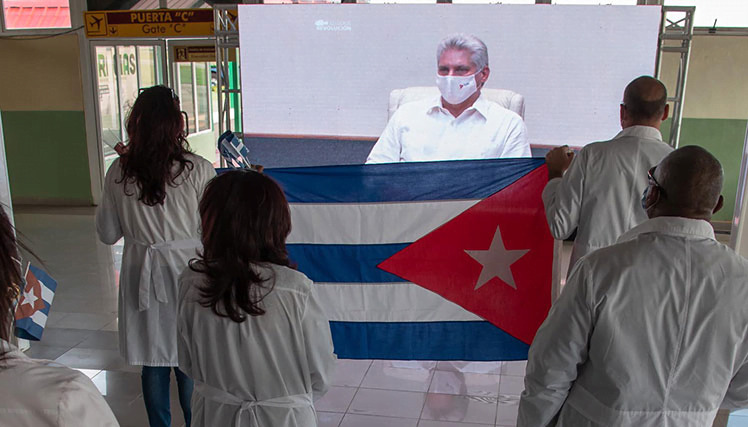
Doctors returning home from Martinique. (Photo: Prensa Latina / José Meriño Céspedes)
Havana, October 10 (RHC)-- Cuban President Miguel Díaz-Canel emphasized that the work of the Henry Reeve Brigade in Martinique is a milestone in the island's medical collaboration, as it is their first experience of solidarity with that French territory.
During the official reception of the 15 health professionals, taking place Friday at the José Martí International Airport, and by means of videoconference, the president pointed out that the members of the international contingent worked successfully in the mission with which they were entrusted.
In this sense, he praised the advice and support in the confrontation with COVID-19 offered during more than three months by the Cuban brigadistas, which deserved the recognition of the people and government of that overseas territory of France.
The Cuban president said that the brigade joins the victorious contingent of Cuban collaborators who have returned home after carrying out Cuba's solidarity convictions.
Diaz-Canel said that with their work, those belonging to the international contingent specialized in disaster situations and serious epidemics express the strength of the Cuban health system and of its protocols of attention.
The health professionals left for Martinique on June 26th to support in the confrontation with COVID-19, and in that time they treated 4,161 patients and participated in 199 surgical operations.
According to the Cuban Ministry of Public Health, they also carried out 1,898 X-ray exams, 425 ultrasound examinations and guaranteed the care of patients who were positive for SARS-CoV-2, the cause of COVID-19.
To date, 52 Henry Reeve brigades have left for 39 countries with more than 3,800 collaborators, who have attended 658,000 patients and saved 14,000 lives.
At this time, 41 brigades of the International Medical Contingent specialized in disaster situations and serious epidemics are collaborating with the governmental efforts of about thirty countries to contain the pandemic.

